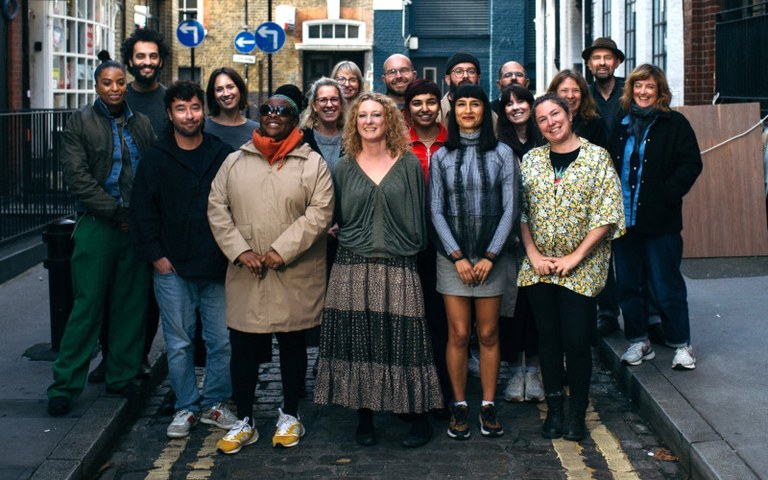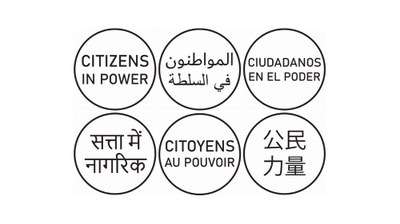Citizens in Power Network
Citizens in Power Network
CIP Network, image by James Allan
Trinity Community Arts is proud to announce its participation in The Citizens in Power Network as part of our work with Citizens for Culture.
The Citizens in Power Network (2025–2027) is a pioneering initiative designed to reimagine decision-making in the cultural and creative sectors and beyond. It brings together organisations, local government, and practitioners to explore how communities can take the lead in shaping their creative and cultural lives.
Cultural decision-making has historically been dominated by privileged groups. This new network is rooted in a clear belief: decision-making processes should reflect the diversity of the people they impact. Citizens in Power will embrace democratic models such as citizens’ assemblies and citizens’ juries, ensuring that those who live, work, or stay in a place have a voice in shaping culture.
Joining the network aligns with Trinity’s ongoing commitment to increasing community power through creativity in Bristol. Through Citizens for Culture, we are working to support cultural participation and decision-making that is more inclusive, representative, and community-led. We’re excited to collaborate with partners across the UK and contribute to shaping the future of the Citizens in Power Network.
Network members:
- Birmingham Museums Trust, Citizens’ Jury: Rob Lewis, Rosie Barker, Sara Wajid MBE, Zak Mensah
- Citizens for Culture, West of England: Anjali Prashar-Savoie (Trinity Community Arts), David Jubb (Citizens in Power), Emma Harvey (Trinity Community Arts), LaToyah McAllister-Jones (St Pauls Carnival), Sarah James (West of England Mayoral Combined Authority)
- Creative Barking and Dagenham, London: Sarah Wickens
- Everyone Here, Jury for Joy, West Cumbria: Kieran Sheehan, Sam Hunt, Unique Spencer
- Metal Culture, Liverpool, Peterborough, Southend-on-Sea: Laura Hensser, Susie Thornberry
- Moseley Road Baths CIO, Birmingham: Lucy Reid (Chair) and Trustees
- New Art Exchange, Voice Assembly, Nottingham: Adam Roe, Saad Eddine Said
- We The Curious, Bristol: Mark Pickering, Nicole Briggs, Rosalie White
Network funders:
- Esmée Fairbairn Foundation
- Calouste Gulbenkian Foundation
Network convenors:
- David Jubb, Citizens in Power
- Saad Eddine Said, Citizens in Power
For more information on Trinity’s involvement in the network, visit the Citizens in Power website.
Opinion: Championing the arts for all
Opinion: Championing the arts for all
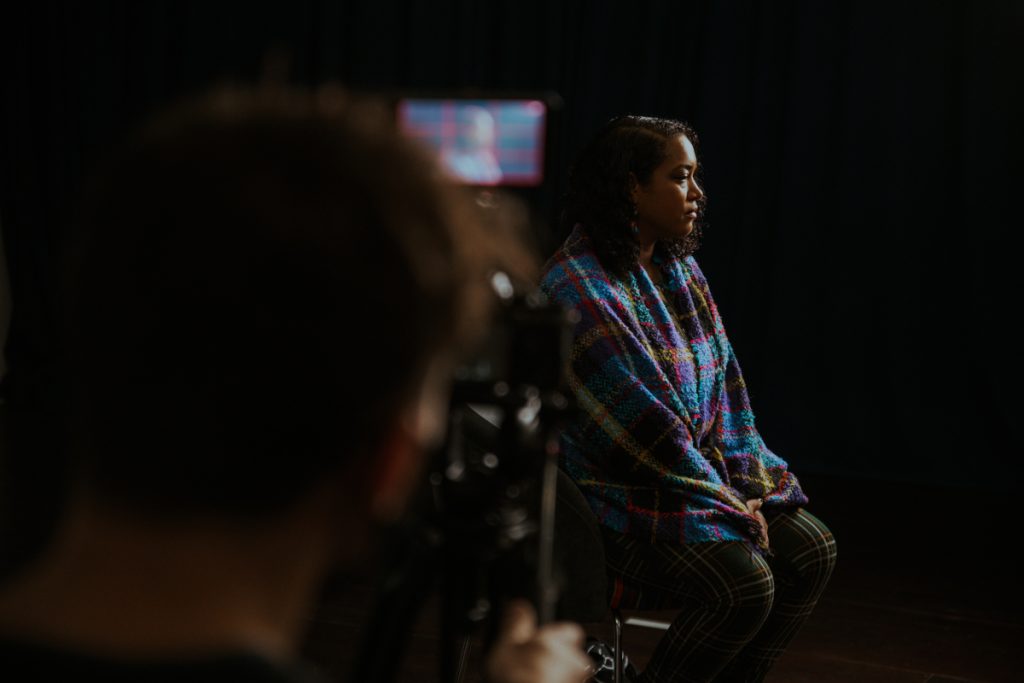
Photo credit: Khali Ackford, Art of Resistance
As part of our interviews exploring the future of culture in the West of England, we spoke with Cleo Lake, an artist, producer, and community leader with nearly 20 years’ experience in curating performances, cultural events, and engagement activities.
In this interview, Cleo highlights the importance of equitable funding, accessible spaces, and fresh, inclusive cultural experiences.
“We will all need to be prepared to be open to whatever is presented if we are truly to have something democratic.”
Tell us a bit about your work in the cultural sector and what drew you to this field.
I didn’t consciously enter the cultural sector, but went from an underground dance artist to doing a dance degree and then curating performances for myself and other artists. Over the last almost 20 years I have produced a number of cultural events spanning music, theatre, dance. I have also led community engagement activities and most of my work tends to relate to my African descent heritage.
What do you feel are some of the current challenges within the cultural sector and how would you suggest these could be addressed?
The challenge will almost always be funding and also spaces to create and deliver at free or low cost. Also, I think the distribution of funding is unequal because organisations with more staff and capacity will likely do better than those who don’t. I like the redistro model of funding.
How do you think the regional cultural sector could benefit from a Citizens’ Assembly model or other democratic decision-making tools?
It will open things up and get the views of ordinary people - not just middle class in-the-know artsy types. So we will all need to be prepared to be open to whatever is presented if we are truly to have something democratic! On the whole I also see it as an opportunity to lobby and/or put forward a collective view.
What are your hopes for the future of Arts and Culture in the West of England?
I hope we’ll have more opportunities for different people to be excited, moved, challenged and energised by totally new and fresh ideas and experiences. I also hope for high streets to be reignited with art, and funding to be more fairly distributed.
What are your thoughts on the upcoming Citizens' Assembly for Culture in the West of England?
It will be interesting and I hope that there will be a broad mix of people from all backgrounds. The ballet go-ers to the ravers!
Anything else you would like to add?
Arts and culture can bring people together and keep people well. I hope this platform will further champion the necessity of arts and culture.
Interested in finding out more?
- Follow Cleo on Instagram
- Read Maca Gomez-Gutierrez’s interview on leadership, inclusion, and the potential of a Citizens Assembly for Culture
- Read our six month look back at Citizens for Culture
- Read the recap of our Citizens for Culture online information sessions
About Citizens for Culture
Citizens for Culture is an initiative from St Paul Carnival CIC, Trinity Community Arts, Citizens in Power and West of England Combined Authority and is supported through funding by Arts Council England, Paul Hamlyn Foundation and Calouste Gulbenkian Foundation (UK Branch).
A Six Month Look Back at Citizens for Culture
A Six Month Look Back at Citizens for Culture
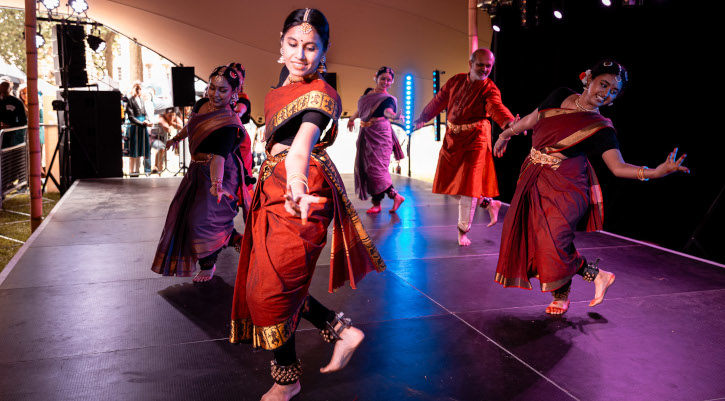
Image credit: Amy Fern
As we move towards the Assembly’s delivery in 2025, here’s a look back at what we achieved in the second half of 2024.
Outreach and Partnerships
Building strong connections has been central to our progress. Since the project’s launch, we’ve worked to establish a wide-reaching network of partners, supporters, and collaborators - from cultural organisations, to community groups, to political leaders.
Over the last six months, we’ve:
- Engaged with more than 100 organisations across the cultural sector, led by our Assembly Producer, who joined us in May.
- Hosted online information sessions in August to connect with cultural organisations and individuals interested in becoming Assembly Associates.
- Secured £100,000 in funding from the Paul Hamlyn Foundation, with additional funding prospects in development.
Designing the Assembly
Creating a representative and impactful Citizens’ Assembly remains central to our work. The Assembly’s design principles have been shaped through collaboration with citizens, community partners, and cultural organisations, with a focus on accessibility and inclusion.
Key steps in the design process include:
- Developing a detailed sortition process in partnership with the Sortition Foundation to recruit a diverse and representative group of Assembly participants.
- Complementing this recruitment process with targeted outreach to historically underrepresented groups, including working-class citizens, young people, and rural communities.
Adjusting the Timeline
The Assembly is now scheduled to take place in autumn 2025, a shift from the original spring timeline. This adjustment ensures we can brief the region’s incoming mayor on the initiative after the spring elections, securing their full support.
Meanwhile, we’ve begun public engagement through events like the Trinity AGM and Speak Out with Young People. These initial conversations have helped develop provocations that will shape the Assembly’s focus on accessibility and inclusion.
What’s Next?
As we move into the next phase of Citizens for Culture, we’re committed to building a representative Assembly and developing an actionable Cultural Delivery Plan. With strong regional collaboration and growing support from funders, the project is positioned to influence cultural planning and governance locally and nationally.
In the comings months, we’ll be:
- Launching a public awareness campaign to engage communities across the region.
- Hosting summer festival events to spark conversations around ‘what culture means to me.’
- Preparing for the Assembly’s delivery in autumn 2025.
We’re excited to set the stage for a more inclusive and democratic cultural future in the West of England.
Interested in finding out more?
- Explore the Citizens for Culture website
- Read Martha King's thoughts on redesigning leadership for a more equitable future
About Citizens for Culture
Citizens for Culture is an initiative from St Paul Carnival CIC, Trinity Community Arts, Citizens in Power and West of England Combined Authority and is supported through funding by Arts Council England, Paul Hamlyn Foundation and Calouste Gulbenkian Foundation (UK Branch).
Look back: Citizens for Culture online information sessions
Look back: Citizens for Culture online information sessions
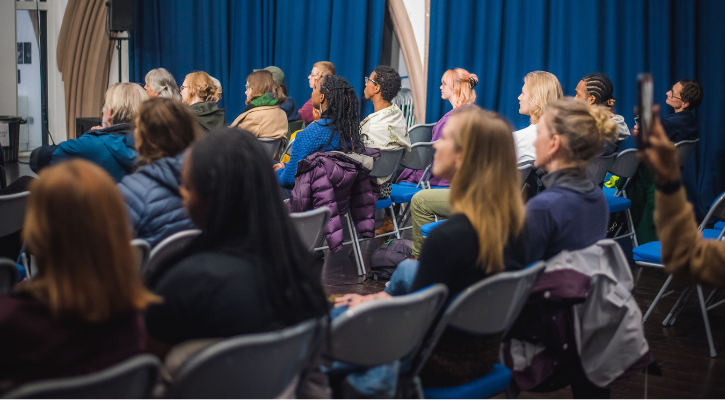
Heritage Talks, Heart & Soul, credit Khali Ackford
This summer, we hosted a series of Citizens for Culture online information sessions as part of our ongoing journey toward the UK’s first regional Citizens’ Assembly for culture, set to take place in 2025.
The sessions, held via Zoom, provided an opportunity to learn about the Citizens’ Assembly, ask questions, and share ideas that would ultimately shape the assembly itself. Hosted by key project partners, including LaToyah McAllister-Jones from St Paul’s Carnival, David Jubb of Citizens in Power and Emma Harvey from Trinity, the sessions provided an open space to discuss and understand how democratic tools can shape and impact the cultural sector, and how they might address challenges that the sector faces.
Across three engaging sessions, participants explored the concept of Citizens’ Assemblies, the potential impact on cultural decision-making, and how individuals and organisations in the West of England can get involved.
Each session covered a different topic. LaToyah McAllister-Jones offered an in-depth look at the assembly’s design, addressing questions about its structure and objectives. David Jubb highlighted the strategic potential of the assembly to impact the region’s cultural ecosystem, emphasising the roles of key stakeholders. Emma Harvey led a discussion on potential questions the assembly might tackle. These discussions sparked conversations and provided a space to reflect on how different people can play a part in this project.
We want to extend a thank you to everyone who joined us for these sessions. Your contributions have shaped the next steps of Citizens for Culture.
We’re now looking for more individuals and organisations in the West of England to become associates with Citizens for Culture. Associates will play a key role in guiding the Assembly, ensuring it reflects the region’s diverse voices and that its outcomes shape the cultural sector for the better.
Head over to the Citizens for Culture website, where you’ll find more ways to get involved, including opportunities to submit evidence, participate in workshops, and stay updated on our progress.
Interested in finding out more?
- Read our six month look back at Citizens for Culture
- Visit the Citizens for Culture website
- Become a Citizens for Culture Associate
About Citizens for Culture
Citizens for Culture is an initiative from St Paul Carnival CIC, Trinity Community Arts, Citizens in Power and West of England Combined Authority and is supported through funding by Arts Council England, Paul Hamlyn Foundation and Calouste Gulbenkian Foundation (UK Branch).
In Conversation: Maca Gomez-Gutierrez on leadership, inclusion and culture
In Conversation: Maca Gomez-Gutierrez on leadership, inclusion and culture
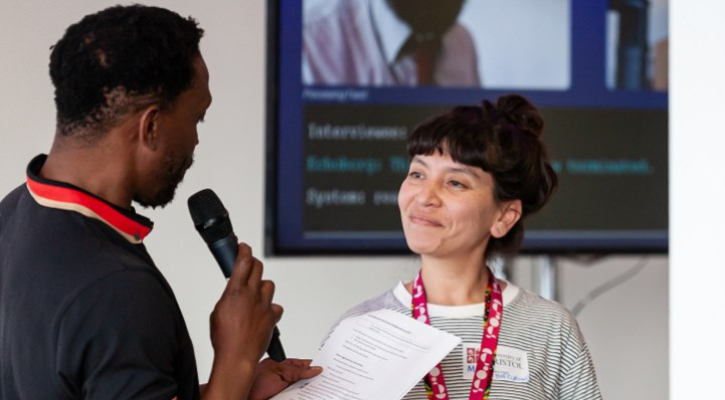
As we prepare for the upcoming Citizens’ Assembly for Culture, we’re speaking to leading voices in cultural engagement and democratic decision-making to inform and inspire the process. The Assembly will bring together citizens - people living, working or staying in the West of England - to shape a regional cultural offer that is inclusive and accessible.
In this interview, we hear from Maca Gomez-Gutierrez, an engagement professional and creative research producer. Maca has a decade of experience connecting research, culture, and community. From co-producing public engagement programs at We The Curious to supporting grassroots organizations in Colombia, her work highlights the transformative power of arts and culture.
Maca shares her insights on the challenges and opportunities in the cultural sector, the importance of diverse leadership, and how a Citizens’ Assembly can help amplify underrepresented voices.
“The Assembly will provide a level of public participation with regional impact that could reframe the way we think about culture”
Hi Maca! Tell us a bit about your work in the cultural sector and what drew you to this field.
As an engagement professional and creative research producer, I am interested in bringing research (in its broadest sense) into the cultural landscape, out of confinement into a space where everyone can be part of the conversation, and everyone’s experience, knowledge and expertise is recognised, welcomed and valued.
I have c. 10 years’ experience in both the UK and global south, most recently (2018-2023) producing We The Curious' public engagement with research programme of activities, workshops and participatory experiences, co-produced with research and community partners. Besides that, a personal favourite of mine (and close to my heart as I’m Colombian!) has been to produce Bringing Memories in from the Margins where I worked with grassroots organisations in Colombia and supported them to bring their creative projects to Bristol. Part of the MEMPAZ Project on inclusive transitional justice and creative memory processes for reconciliation in Colombia, Bringing Memories in from the Margins was a public programme of events including food, theatre, music and photography that took place over a week in March 2023 across multiple venues.
Personally, I like to mull over things, question, get angry, celebrate, explore alternatives; and I enjoy creating collective experiences and spaces where others might do so as well. There are so many important conversations and developments happening in the research world and we should all be participating in these. I think arts and culture have the potential to bring together all sorts of topics, practices, and experiences in ways that are innovative, surprising, engaging and that talk to and challenge our humanity; that’s what’s drawn me into this field.
What do you feel are some of the current challenges within the cultural sector and how would you suggest these could be addressed?
Beyond the obvious (lack of funding!), I feel there is a lack of diversity at leadership level. Specifically, a lack of diversity of ideas which of course arise from a lack of diversity of life experiences. I believe that a step towards solving this challenge is to recognise that leadership exists in different ways, and that many leaders sit outside the hierarchical structures of cultural organisations; implementing a collective approach to leadership can only be beneficial for the sector.
An additional challenge for me is how can we, as a sector, provide a cultural offer that reflects the ever evolving and changing nature of culture; particularly when we often experience a version of it that is static and monolithic. For me, once we recognise that culture is not only what has been labelled as so in museums, galleries etc. but an essential part of our everyday life- what we eat, how we eat, how we dress, the music we listen to, the very expression of our selves- then the cultural offer will increasingly reflect this and inhabit an ever growing diversity of spaces and experiences.
How do you think the regional cultural sector could benefit from a Citizens’ Assembly model or other democratic decision-making tools?
A Citizen’s Assembly model has the potential to bring into the conversation voices that are not usually present, have very low representation or might be completely excluded. For people participating in them, there can be a sense of ownership, of being able to have a say in what cultural offer their community and beyond might be able to engage with in the future.
This can only benefit the regional cultural sector since a sense of collective ownership and belonging can lead to more engagement with existing and future cultural offer. What’s more, the Assembly provides an opportunity for cultural organisations in the region to better understand people’s wants and needs, especially of those who are not regularly, if at all, coming through the doors.
What are your hopes for the future of Arts and Culture in the West of England?
I would like the arts and culture sector in the West of England (and everywhere else as a matter of fact!) to be a viable career option for young people of all backgrounds and not just for the ones who can afford it; and I would like the required infrastructure to support this to be in place e.g., strong arts programmes at schools, access to culture, paid training opportunities etc.
I would also like arts and culture to be truly recognised and valued as an important vehicle for civic engagement. Arts and culture permeate everything, it is the soil where an infinite number of wonderful things can grow on. We need a well-kept and healthy soil, one from where conversations, interactions, partnerships, friendships and action can sprout.
What are your thoughts on the upcoming Citizens' Assembly for Culture in the West of England?
It’s very exciting! The Assembly will provide a level of public participation with regional impact that could reframe the way we think about culture- what is culture and who gets to decide it? what do people want to consume and where? etc.- as well as potentially catalyse a truly innovative cultural offer.
I also believe that it could be the beginning of a stronger relationship of trust and partnership between audiences and the cultural sector, rooted in that very sense of ownership and belonging, which makes the uptake of the Assembly recommendations even more crucial as there will be an expectation to see at least some of the outputs from the Assembly materialise in a future cultural offer.
Anything else you would like to add?
As I was typing these answers, a thought came to me: a Citizen’s Assembly model could allow the ones of us who cannot vote in any elections (not British, not Commonwealth, not European) an opportunity to participate in democratic processes; and this can only be a good thing.
Interested in finding out more?
About Citizens for Culture
Citizens for Culture is an initiative from St Paul Carnival CIC, Trinity Community Arts, Citizens in Power and West of England Combined Authority and is supported through funding by Arts Council England, Paul Hamlyn Foundation and Calouste Gulbenkian Foundation (UK Branch).
Reclaiming Narratives: Mya Fraser
Reclaiming Narratives: Mya Fraser

Mya is part of Mandala Theatre Company. Credit Seed Guardians/Mandala Theatre Company
We are committed to creating ways in which citizens can take an active role in shaping arts and culture, through projects such as Citizens for Culture. This Autumn we are inviting creatives and activists in the West of England to respond to the Black History Month 2024 theme ‘Reclaiming Narratives’ through the lens of Citizens For Culture’s core principles of inclusion, and voice and influence. In the second of this content series, writer and actress Mya Fraser shares her poem Justice.
Reclaiming the Narrative: Mya Fraser and Justice
Justice
Think of a boomerang, an object which is designed to return
back to that throws forcer. What happens if it doesn’t come back?. History. Left behind whilst they dare to live without them. I believe in clarity. what i would like to clarify is the detachment clarify the sadness the hurt the wonders. I believe in comfort. something you can’t breathe properly without. your beats no longer stating the same rhythms. that irregulation speaks volumes. the very same songs the luth sings isolated. As if there’s a complete loss of control. where lies the control when the one creator's captured fix stays lost. You've Left the hand waiting behind whilst finding that paternal break. The originator plucks the air it once sat. pondering in what it’s doing. Where are you? Hopeful you’re homesick. do theirs caress better? do theirs care for more?. Remaining wishful of tracing those invisible tracks in which the sand once led for you. Fulfilling the void that formed in your absence. To hear your sound once more would be an extraordinary pleasure in the figure and in the residential care of your beloved. Bring them home. Because again, I believe. and what i believe in most is a happy ending. rewriting a story doesn’t change the idea of the first plot, it manipulates the initial honesty. Here’s to history.
About Mya Fraser
Mya Fraser is a 20-year-old actress and writer, brought up in Oxford. At the age of 15 she decided to begin her acting career by joining young theatre companies based in her hometown. She later went on to receive her acting diploma in 2022 on a two year A-level equivalent diploma course at Bristol School of Acting. Fraser has been on multiple international tours with Mandala Theatre Company and is currently in their show Seed Guardians.
Follow Mya on Instagram
Interested in finding out more?
- Read the first part of this series, an exploration of NGAIO's music video Goddess
- Email Imogen@trinitybristol.org.uk to join our Citizens For Culture mailing list
- Find out more about what a Citizens’ Assembly for Culture is in this Q&A
- Become a Citizens for Culture Associate
Citizens for Culture is an initiative from St Paul Carnival CIC, Trinity Community Arts, Citizens in Power and West of England Combined Authority and is supported through funding by Arts Council England, Paul Hamlyn Foundation and Calouste Gulbenkian Foundation (UK Branch).
Reclaiming Narratives: NGAIO
Reclaiming Narratives: NGAIO
We are committed to creating ways in which citizens can take an active role in shaping arts and culture, through projects such as Citizens’ for Culture. This Autumn we are inviting creatives and activists in the West of England to respond to this year’s Black History Month theme ‘Reclaiming Narratives’ through the lens of Citizens For Culture’s core principles: inclusion, voice and influence. In the first of this content series DJ, vocalist and songwriter NGAIO discusses her music video Goddess.
Reclaiming the Narrative: NGAIO and Goddess
The creation of this music video was so important to me, to tell my story of what it’s been like to find myself and my beauty in a Western world as a mixed-race woman. The beginning scenes were filmed on the streets of St Pauls, where my topless billboard was put up as part of the Censored campaign, which was put together to raise awareness about the sexualisation of women's nipples and the persecution received when seen in public.
"Goddess is about saying we're all Goddesses - no matter what anybody tells us, we are exactly what we need to be. We don't need to starve ourselves. We don't need to have the same face and body. Our uniqueness is what makes us individuals."
Men can go topless at any time, but women can’t, why is that still the case? It folds into a wider discussion about how heavily women’s bodies are policed when we look at reproduction and beauty standards - it all comes back to what external people think women should do with their bodies and how they should look (which changes all the time). These consistent messages of scrutiny in society through the media, and comments made and overheard, led me to feel deep shame, embarrassment, and fear.
I have been on a journey of loving my curves and accepting - some days even appreciating - my lumps and bumps. Never in a million years when I was young did I think I would feel steady enough to not only be pictured without a top on, but to let that be shown to the world on a street five minutes from where I grew up.
Goddess is about saying we're all Goddesses - no matter what anybody tells us, we are exactly what we need to be. We don't need to starve ourselves. We don't need to have the same face and body. Our uniqueness is what makes us individuals. Whatever the shape, size, colour, or gender; you are a Goddess in every sense of the word. People try to tell us that we should look a certain way or act a certain way. We're consistently being told who we should be, but how we feel about ourselves shouldn’t be dependent on the external world. We are more expansive than that.
Goddess is about understanding that we are connected to more than this moment we're in right now on this planet. It is about the connection that we have with our spirituality and our ancestors which is why in the middle scenes I’m surrounded by foliage outside with my natural hair picked into an afro. These scenes were to symbolise the necessity of connecting with nature and the Earth from which we are all born and will all return. Some see the Earth as a rock we live on that serves us, and that is so sad. This living, breathing, organism has given us and our ancestors life - it continues to connect us in space, spanning time we can’t even fathom.
The breakdown in the song is a celebration of that realisation that we are our past and our future and if we are ever feeling lost or unsure, we can tap into the Goddesses inside us to find our way. Through connection to nature or connection to ourselves - knowledge and love are always there, inside us. It ends on a scene which was a nod to a duo who have inspired this new chapter of my musical journey - Ibeyi and their first release, River.
It was filmed by Charlotte Sawyer, a long-term collaborator and lover of nature who’s just won an award for her incredible documentary Rave on for the Avon to raise awareness about the dangerously unsanitary state of our water in East Bristol.
This song - for me at least - was made for moments when I’m feeling unsure, to calm me with melody and stillness, to shake me up with love, before releasing me back into the world. I hope it can do the same for you.
About NGAIO
NGAIO, the versatile artist renowned for her vocals, songwriting, and DJing prowess, seamlessly blends these talents to craft electrifying live performances. This year, she will debut her first self-produced EP 'Four Quarters' and accompanying live show, featuring live vocals and recreations of her productions delivered through Ableton Push. Soundscaping trip hop, jazz, bass and global music in a multigenre sound reflecting her travels - there's something for everyone. As a mixed-race woman, NGAIO infuses her artistry with personal experiences, enriching her music with poignant storytelling told through spoken word and jazz-infused vocals delivered with passion.
Transitioning from band and DJ gigs to curating a solo show, NGAIO intricately weaves jazz and underground bass influences, earning comparisons to the eclectic iBeyi and Greentea Peng. Beyond music, NGAIO advocates for cultural understanding, bridging divides between races and classes.
Check out NGAIO’s website or socials @ngaioamusic
Videographer - Charlotte Sawyer
Photographer - Charley Williams
Interested in finding out more?
- Email Imogen@trinitybristol.org.uk to join our Citizens For Culture mailing list
- Find out more about what a Citizens’ Assembly for Culture is in this Q&A
- Become a Citizens for Culture Associate



Citizens for Culture is an initiative from St Paul Carnival CIC, Trinity Community Arts, Citizens in Power and West of England Combined Authority and is supported through funding by Arts Council England, Paul Hamlyn Foundation and Calouste Gulbenkian Foundation (UK Branch).
Become a Citizens for Culture Associate
Become a Citizens for Culture Associate

'Citizens for Culture' is bringing together citizens - people living, working or staying across the West of England - to explore how creative opportunities can be inclusive and accessible for everyone in the region.
Taking place in 2025 this ambitious project aims to co-create a Cultural Plan for the three areas in the West of England Combined Authority.
As part of the successful delivery of the assembly, we are calling out for freelancers, artists, individuals, cultural workers and organisations to sign up to be ‘Assembly Associates’.
Associates will be advocates for citizens-led culture and will support the campaign by:
-
Shaping the design of the assembly and associated activities
-
Sharing Citizens for Culture opportunities within their networks and communication channels
-
Submitting evidence to be presented to citizens in the assembly
-
Publicly advocating for the outcomes of the assembly in their own practice, work or organisation
Why sign up?
Becoming an associate of Citizens for Culture offers an opportunity to actively shape the future of citizen-led culture for the region.
By joining Citizens for Culture, you can connect with audiences and others in the sector from across the region more directly. By signing up as an Associate you will have the opportunity to influence cultural policy, expand your networks and advocate for meaningful change in your own communities and sectors.
Find out more:
If you are interested in becoming an associate of Citizens for Culture and would like out find out more please get in touch with Citizens for Culture Producer Anjali at anjali@trinitybristol.org.uk
In Conversation: What is a Citizens' Assembly for Culture?
In Conversation: What is a Citizens' Assembly for Culture?
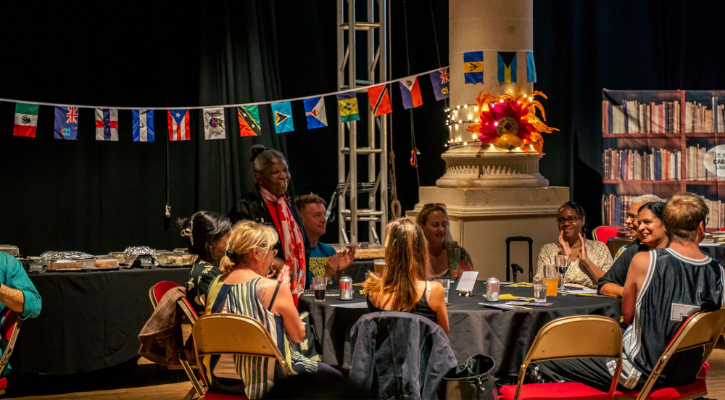
Citizens for Culture is ground-breaking initiative bringing together people from across the region to meet with creative practitioners, cultural providers and decision-makers to create a Cultural Plan for the region.
Delivered in with St Pauls Carnival, Citizens In Power and the West of England Combined Authority, the project will host the first region wide Citizens’ Assembly for Culture in 2025.
We caught up with Producer, Anjali Prashar-Savoie and Project Manager, David Jubb, to ask some key questions about the project - what is it, why we’re running it and what we hope to achieve.
David and Anjali - what is a Citizens Assembly for Culture all about?
A Citizens' Assembly brings people together to learn about and deliberate issues and together, reach conclusions about what they think should happen.
Our project, Citizens for Culture, will invite citizens from areas in the West of England to create a set recommendations for a Cultural Plan for the West of England Combined Authority Region.
Taking place across multiple sessions citizens will explore how creative opportunities can be inclusive, accessible and representative of the many people living across the region. They will immerse themselves in creative and cultural activities, hear from experts who will share their knowledge about creativity and culture and then, working together, develop recommendations for a Cultural Plan to be delivered across three regions in the West of England.
Following the Assembly, citizens will oversee the implementation of the Cultural Plan with support from funders, local authorities, organisations and individuals, all working together to deliver these citizen-led recommendations.
What is the story so far?
"By using this democratic approach we will hope to inform future cultural policies and priorities for the West of England, creating a legacy that will serve as a model for the UK's continually evolving arts and cultural landscape."
The project was created in response to the partners wanting to explore how using a Citizens Assembly model - a deliberative, democratic and people-centred approach - could reimagine what a cultural offer could look like in the South West.
Each partner brings their own skills to the project - St Pauls' Carnival CEO, LaToyah Mcallister-Jones brings her wealth of expertise and experience in leading and facilitating Assemblies.
Using their expertise in citizen-led decision making, Citizens In Power have been securing support for each stage of the project, from the initial research phase in 2022 to the delivery of the final Assembly in 2025 and Trinity's CEO, Emma Harvey, brings over 20yrs of expertise of using arts and culture as a tool for civic participation.
Together, we delivered a research phase for the Assembly, where the principles for the design were shaped by a group of people from across the region, chosen through a random selection process.
Based on these design principles, the Assembly was further developed by people working in the cultural sector. The research phase provided the building blocks for the framework for the planned 2025 Assembly.
Why are you running Citizens for Culture?
The Assembly aims to help shape a regional cultural offer that is relevant, accessible and reflective of diverse voices and perspectives. By co-creating cultural leadership and decision-making with the people who live, work and stay in our region, we hope to build a more democratic approach that will help shape the future direction of culture in the West of England.
What do you mean by “citizens” and “culture”?
When we say citizens, we simply mean the people who live, work or stay in a place.
We feel that the Assembly is best placed to arrive at its practical definition of culture - one that best serves the creation of the regional Cultural Plans. We want to ensure the people taking part can participate fully and that thoughtful conversations happen that aid in guiding this. By allowing the Assembly process to refine this definition, we hope to ensure that the Cultural Plan has a clear focus and achievable goals, while still acknowledging the richness of cultural diversity across the regions.
"By using this (a Citizens' Assembly model) democratic approach we hope to inform future cultural policies and priorities for the West of England, creating a legacy that will serve as a model for the UK's continually evolving arts and cultural landscape."
How do people get involved?
Citizens will be invited to participate in the Assembly through a sortition process, or democratic lottery, rather than by election or appointment. This ensures that the selection is impartial and includes a wide representation of community voices from across the region.
We're continuing to invite people and organisations working in the cultural sector to help shape plans for the 2025 Assembly.
If this sounds like you, we’d love to hear from you - feel free to get in touch with the Citizens’ Assembly producer, Anjali Prashar-Savoie, at anjali@trinitybristol.org.uk to arrange a chat.
Find out more about Citizens for Culture:
-
Read LaToyah McAllister-Jones opinion piece on her experiences of facilitating democratic decision-making in the second part of this series about civic participation
-
Read Edson Burton’s opinion piece of why voting matters in the second part of this series about civic participation
-
Email Imogen@trinitybristol.org.uk to join our Citizens For Culture mailing list
Citizens for Culture is an initiative from St Paul Carnival CIC, Trinity Community Arts, Citizens in Power and West of England Combined Authority and is supported through funding by Arts Council England, Paul Hamlyn Foundation and Calouste Gulbenkian Foundation (UK Branch).

Opinion: Voices in Decision-Making
Opinion: Voices in Decision-Making
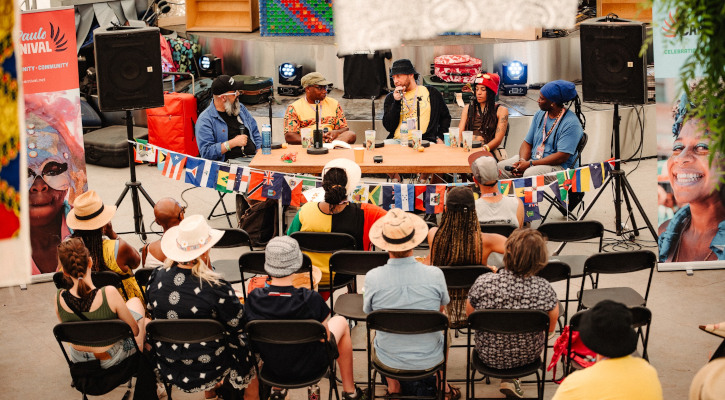
St Pauls Carnival Panel Discussion at Glastonbury Festival 2024 - Image Credit: Khali Ackford
Trinity is committed to creating ways in which citizens can take an active role in shaping arts and culture. As part of this commitment we are connecting with leading voices in the cultural sector to ask them to share their thoughts on the different civic and democratic tools that we as citizens can access. In the second in our series of opinion pieces exploring civic participation LaToyah McAllister-Jones, Executive Director of St Pauls Carnival, reflects on her experiences of using various tools to facilitate democratic decision-making.
Opinion: Voices in Decision-Making, LaToyah McAllister-Jones
I have always been attracted to work and play that enables people to have a voice. To be heard. After years of working with marginalised groups, from managing accommodation services for street homeless people to community organising in Hackney, I have developed an interest in the right to influence decisions being made about our lives.
One of the most interesting things about leading a community arts organisation is just how integral the community is to our work. St Pauls Carnival CIC is merely a custodian for the iconic event; we provide a stage and the community fills those spaces. Carnival celebrates African Caribbean talent in St Pauls and beyond as well as our culture and heritage. Our communities continue the traditions of our ancestors using music, dance and storytelling to share lived experiences and connect to our heritage. This is one of the most important things about our event: it allows us to tell our own stories, in our own words, using our voices.
In 2021, I was asked by Involve to facilitate Bristol City Council's Citizens’ Assembly supporting policy development in housing, health inequalities and transport as the city emerged from Covid. The process was new to me, and I loved the way it cut through many of the challenges that we often come up against when engaging communities:
- Participants are randomly selected, and usually aren’t experts in the central assembly topic. There is a process to ensure that all participants are able to meaningfully contribute to the discussions, and this is critical to the success of an assembly.
- The process seeks to facilitate consensus, rather than debate which tends to have a winner and a loser.
- Participants are encouraged to explore what their real priorities are and what they might be prepared to forego for those priorities.
- Assemblies bring together a diverse range of people who you wouldn’t necessarily find together in a traditional social setting. This creates an opportunity for vastly differing viewpoints to be heard and influence how others participants might think about a topic.
St Pauls Carnival are currently delivering a Citizens’ Assembly for Culture in partnership with Trinity Community Arts, Citizens In Power and West Of England Combined Authority. The idea developed just as we were coming out of the pandemic and thinking about the lessons learnt; particularly the role of community. Together, we were curious about what it would look like to use the assembly process - democratic, person-centred and thinking about strengths of a place, its people and its assets - to reimagine what the cultural offer could look like in the South West region.
Democratic decision-making allows citizens to actively contribute to the discourse that shapes their communities. We also believe culture is experienced by everyone, in many different ways, and everyone should be able to access the culture that represents them. If this is to be the ambition, it is vital that we put people at the centre of that process. This means understanding how people experience culture, what it means to them and, as cultural leaders, asking ‘how can we reflect this in our approach and programming?’
The new Labour Government expressed an interest in the use of Citizens’ Assemblies earlier this year, and the format has been used to unpack challenging issues like abortion in Ireland. The South West region is already embedding this approach into how we speak to our communities, and we are at the forefront of using assemblies to understand how we deliver for everyone, and not just those who can afford it or who have easy access to culture.
Our Citizens’ Assembly for Culture project offers an exciting opportunity to create a new approach to engaging people in the cultural life of a place. The Assembly will take place in Spring 2025 as a central programme within Culture West, funded by the West of England Combined Authority and Arts Council South West. The recommendations coming from this Assembly will become part of the regional approach to delivering a citizen-led cultural offer.
Find out more about the Citizens' Assembly for Culture project:
- Read the first piece in this series about civic participation: Edson Burton’s exploration of why voting matters
- Sign up to an online information session with the Citizens' Assembly team
- Email Imogen@trinitybristol.org.uk to join our Citizens For Culture mailing list
- Read our blogs to find out more about the Citizens' Assembly project
In Conversation: Anjali Prashar-Savoie
In Conversation: Anjali Prashar-Savoie
In partnership with St Pauls Carnival, Citizens In Power and West of England Combined Authority we are delivering a Citizens’ Assembly for Culture in 2025.
This ground-breaking initiative will bring together people from across the region, to meet with creative practitioners, cultural providers and decision-makers to shape the future of a cultural delivery plan for the region.
We have recently recruited Anjali Prashar-Savoie as the Citizens’ Assembly Producer to help with the successful delivery of the Assembly. We caught up with her to find out more about the project that will take place in 2025.
Q: Hello Anjali! Can you tell us a bit about yourself and how you’ve come to be the producer of the Citizens’ Assembly.
A: I've been working in the cultural sector and in nightlife with a focus on grassroots culture, community organising, and creating spaces that prioritise people, equity, and access. I'm really passionate about how culture can drive new forms of social and civic participation, especially given the current political, environmental, and social challenges that we collectively face.
This experience led me to the Citizens’ Assembly Producer role. I'm grateful to contribute to something that represents the kind of systemic change we need in both culture and society as a whole. Often, we know what challenges we face in culture and beyond, but practical moves towards solutions can be difficult to organise at scale. The Citizens’ Assembly stood out to me because it offered a practical model for doing culture differently.
Q: What has your experience been of the job so far?
So far, I've been connecting with cultural workers, organisations, and grassroots organisers to get people involved in the project and understand how Citizens' Assemblies can be useful. I'm also working on expanding a wider Citizens for Culture network to make sure that the Assembly is shaped by the people it serves.
Q: You’re currently working on connecting with other cultural organisations and individuals in the region over Citizens For Culture. Why would you encourage people in the cultural sector to get involved with the project?
The sector is filled with incredible talent and group efforts that make for an exciting and diverse culture. However, sometimes the work on the ground doesn't trickle upwards into decision-making and policy. On top of that, a lot of the cultural sector is made up of freelancers who work somewhat disconnected from each other, meaning we work in silos.
Engaging with Citizens for Culture will connect people interested in citizen or community-led culture. This means you can expand your network, share information, skills, and resources, participate in upcoming workshops, and contribute to collective advocacy efforts to influence policies and secure better support for culture in the region. It provides an opportunity to build meaningful relationships with citizens and other cultural workers, creating a collaborative community with shared goals of doing things differently.
Citizens for Culture also connects you with the Citizens’ Assembly set to happen early next year. We are looking for people in the cultural sector to become associates of the assembly and help guide what happens next. By engaging with this project, together, we can make sure your voice is amplified to shape the Assembly, and that the outcomes of the assembly are supported. Overall, this is a region-wide collaborative project that is worth being a part of because the process and outcomes will be determined by the people who join.
Q: Anything else you would like to add?
We are offering online information sessions over the summer to learn more. The sessions will cover what a citizens’ assembly is and how you can get involved. In these sessions, we will also be seeking your input into our upcoming workshop series that will run throughout the Autumn.
Additionally, I love to chat. If you are a creative, cultural worker, venue, organisation or community organiser in the region, I would love to hear from you. Please feel free to reach out to me directly to chat about all things culture, community and citizens' assembly.
Find out more about the Citizens' Assembly for Culture project:
- Sign up to an online information session with the Citizens' Assembly team
-
Email Imogen@trinitybristol.org.uk to join our Citizens For Culture mailing list
-
Read Edson Burton’s opinion piece of why voting matters in this series about civic participation
-
Read our blogs to find out more about the Citizens' Assembly project
In Conversation: David Jubb and Citizens for Culture
In Conversation: David Jubb and Citizens for Culture
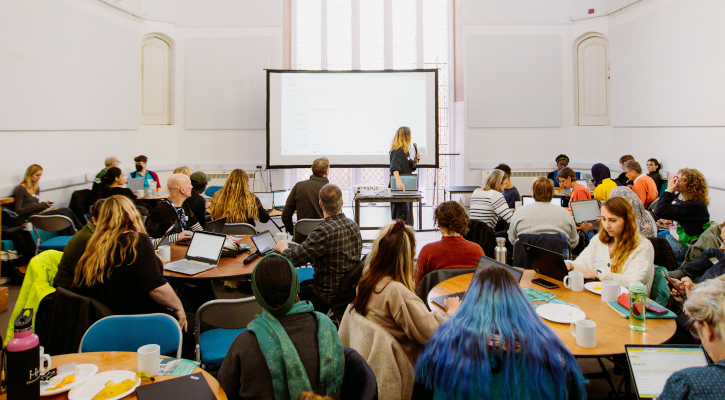
Image Credit: Alastair Brookes
In partnership with St Pauls Carnival, Citizens In Power and West of England Combined Authority we are delivering a Citizens’ Assembly for Culture in 2025.
This ground-breaking initiative will bring together people from across the region, to meet with creative practitioners, cultural providers and decision-makers to shape the future of a cultural delivery plan for the region.
We are currently recruiting for a Producer to help with the successful delivery of the Assembly. We caught up with David Jubb, Co-Director of Citizens In Power, to find out more about the role, the Citizens for Culture project and the plans for the 2025 Assembly.
Hi David! Tell us more about the role and what they'll be working on.
This is a role that I wish had been around when I was developing my practice as a producer. I would have jumped at it. The role will oversee the entire citizens’ assembly process over the coming 12 months. This will include all the current development stages, procuring key partners and laying the groundwork for the UK’s first citizens’ assembly to create a cultural plan for an entire region. The role will work closely with assembly members, supporting their needs and ensuring that each one has a positive and inspiring experience. They will also establish the framework for the assembly’s recommendations to be carried forward. I think one of the many exciting things about the role is that citizen-led decision-making, such as citizens’ juries, citizens’ assemblies and panels, are growing in the creative and cultural sector. So the successful candidate will put themselves in an interesting position in terms of the future opportunities in the sector.
The ideal candidate would be someone who believes in the idea of citizens’ assemblies and cultural democracy, is committed to equity and inclusion in their practice, excels in complex projects with multiple partners, and has an interest in the strategic side of producing. What I mean by this is not just a desire to nail the deliverables each day, but on how those deliverables link to a wider set of strategic aims and partners. This project is a lot about inviting people to work together to lead change – so if they have a passion for supporting change then the role would suit them very well.
Who would the Citizens’ Assembly Producer get to work with?
They would work closely with all the project partners: LaToyah McAllister-Jones, Executive Director of St Pauls Carnival; Emma Harvey, CEO of Trinity; Sarah James, Creative and Cultural Programme Lead at the West of England Combined Authority. Each partner brings different experiences to the project. LaToyah works with Involve to facilitate assemblies as well as her extensive professional experience in and out of the cultural sector. Emma has been a driving force for how cultural buildings can use creativity as a tool for civic participation. Sarah is leading Culture West, a regional programme which brings practitioners together to create a transformational shift to co-created models of practice. The producer would also work with me. My background is in the cultural sector. I was artistic director and CEO of Battersea Arts Centre from 2004-19, before becoming more interested in citizen-led decision-making. Last year I co-founded Citizens In Power as a not-for-profit organisation, with the purpose to co-design ways for citizens to lead decision-making.
In addition to the project partners, the producer would work with the assembly’s Oversight Panel and Advisory Panel, independent groups who will advise on equity and inclusion, and select evidence for the assembly to consider. They will also collaborate with the Lead Facilitator, the Combined Authority and four Unitary Authorities, the assembly’s funding partners, Arts Council England and Gulbenkian Foundation, and everyone involved in the production and logistics of the assembly itself. It’s a big team!
What does success look like for you within this project?
By having a citizens’ assembly for creativity and culture, the project aims to democratise decision-making in the cultural sector. The assembly will empower citizens to co-create a vibrant, inclusive cultural delivery plan for the West of England. It’s important to know that when we say “citizens” we mean people who live, work or stay in a place – i.e. everyone! Success will be a project that constantly challenges itself on issues of equity and inclusion.
Essential success measures are inclusive participation, constructive deliberation and actionable recommendations. We are involving both citizens and practitioners from the sector in the design of the assembly to help us achieve this. Of course, the real test of success for Citizens for Culture will be the delivery of the assembly’s outcomes. This will require the collaboration of lots of different partners: from councils, sector organisations, communities, funders to individuals, all working together to make change happen. We need to grow many of these partnerships in advance of the assembly happening in 2025. We also hope Citizens For Culture provides inspiration for other councils and funders which are seeking to create future delivery plans by putting citizens at the heart of the process.
Anything else you would like to add?
I think this promises to be an inspiring project. I can guarantee that the successful candidate, whether coming with a cultural sector background, or a background in deliberative democracy, will learn lots and widen the kinds of opportunities they can pursue in the future. Come and work with us! Deadline for application is Tuesday 9th April at 5pm and application information is here.
Look Back: Models of Listening and Participation in Culture
Look Back: Models of Listening and Participation in Culture
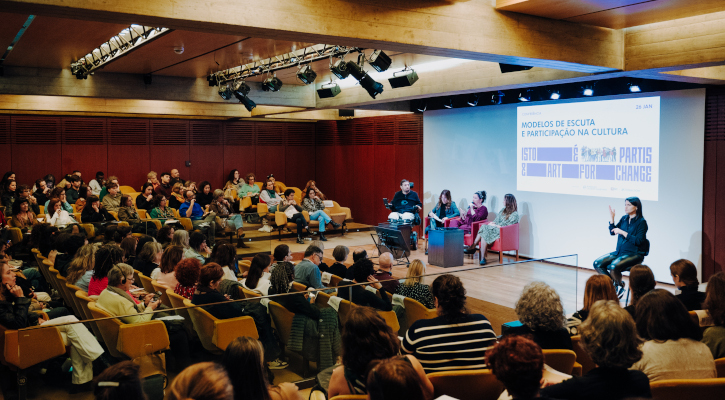
Isto é PARTIS & Art for Change 2024 - Image Credit: Carlos Porfirio
In January, Trinity participated in the Isto é PARTIS & Art for Change 2024 conference held in Lisbon, Portugal, shining a spotlight on the transformative potential of citizen-led approaches in the arts.
The Calouste Gulbenkian Foundation and "La Caixa" Foundation are actively working to platform and support the tangible impact of participatory arts initiatives, reshaping cultural dynamics, and fostering more just and cohesive communities. The conference served as a beacon for continued dialogue and action in the pursuit of a more inclusive cultural landscape.
Featuring panels exploring diverse methods of citizen involvement in cultural dynamics, Trinity Community Arts, represented by CEO Emma Harvey, emphasized the significance of creative community spaces in shaping cultural dynamics in the arts. Emma shared insights into Trinity's work managing the Trinity Centre as a publicly-owned civic arts space, alongside efforts to save another publicly-owned asset, Jacobs Wells.
Trinity shared a panel with Lara Seixo Rodrigues, Marta Silva, and Miguel Atalaia, highlighting examples of collaborative and citizen-led cultural activity, including the Largo Residências in Lisbon and the Bons Sons festival in Tomar. Bons Sons - akin to Trinity's annual Garden Party, the annual community festival involves the entire village coming together to deliver a celebration of music, culture and local pride—an inspirational example of true citizen empowerment.
Trinity's partner, Saad Eddine Said, Co-Director of the Citizens in Power initiative, delivered a keynote speech on avenues for active citizen-led decision-making. Trinity, in is working with Citizens in Power and St Paul’s Carnival, to develop a Citizen Assembly for Culture, supporting communities in the West of England Combined Authority to shape their cultural delivery priorities and plans – funded by Calouste Gulbenkian Foundation (UK Branch) and the West of England Combined Authority. The conference also highlighted Battersea Arts Centre’s social enterprise programme, The Agency, which uses a co-design model to support young people to unlock their creative potential.
This collaborative effort, led by The Calouste Gulbenkian Foundation, amplified initiatives that are unlocking the transformative power of citizen-led approaches in the arts. The Foundation's commitment to fostering partnerships between communities, creatives, and institutions, as showcased in the PARTIS & Art for Change initiative, exemplifies a forward-thinking approach to shaping the future of towns and cities. This conference facilitates key conversations and projects that contribute to the creation of more just, cohesive and culturally vibrant communities.
Further reading:
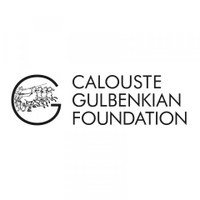
Investment in culture for the West country
Investment in culture for the West country
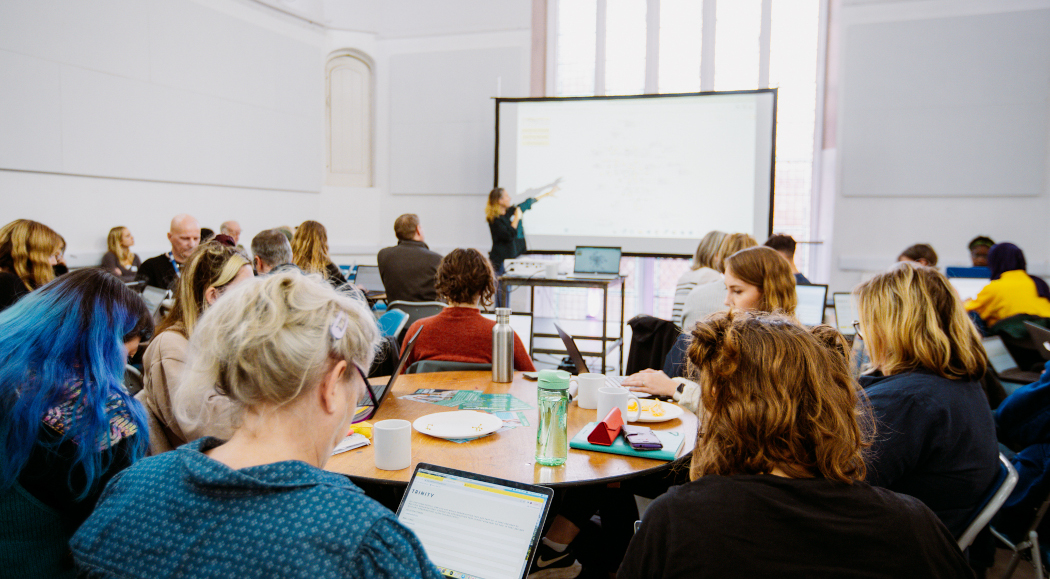
Community stakeholders take part in Understory a digital mapping session by Onion Collective and Free Ice Cream. Photo credit: Trinity Community Arts/Alastair Brookes
A £3.1million investment package has been secured by Mayoral Combined Authority from Arts Council England and match funders to deliver a two-year programme that will open up the creative sector to more diverse talent, to create opportunities for more communities take part and create arts experiences and build a resilient sector that will drive economic growth in the West of England.
'Culture West' will include the creation of a citizen-led cultural delivery plan for the West of England region in 2024 through our Citizens' Assembly project that we developed in collaboration with St Paul's Carnival and David Jubb (Citizens in Power).
The Citizens' Assembly pilot took place in 2023 and was funded by the Celeste Gulbenkian UK Branch. As part of the partnership project, we delivered a series of exploratory workshops that included inviting South West residents to take part in sessions. The pilot project has helped shape the delivery for the 2024 project region-wide Citizens' Assembly.
Alongside the Citizens' Assembly. 'Culture West' will also offer support for creative professionals, mentoring and business advice, commissioning new festivals and offering industry-led skills training. The project will also see the region's schools have increased access to inclusive cultural experiences, with support for museum and theatre visits, artist residencies, and skills sharing.
Citizens Workshops
Citizens Workshops
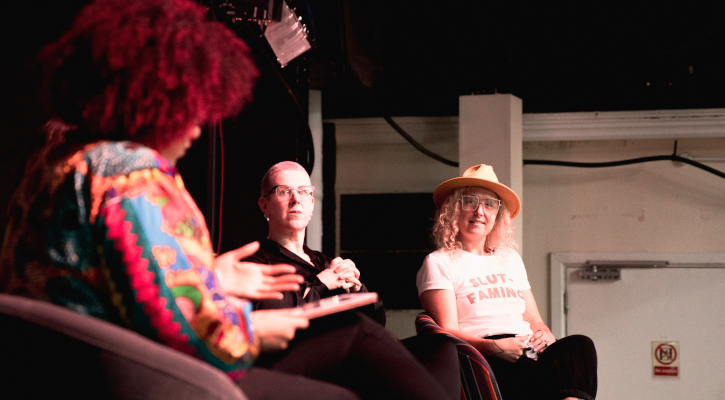
Panel discussion as part of 'Final Frontier'. Image credit: Khali Ackford
In partnership with St Paul’s Carnival/Trinity and Citizens In Power, we have been exploring how a representative group of citizens from across the west of England could create a cultural strategy and delivery plan for the region. Following our research phase we are now undertaking a series of ‘citizens panels’ with people from across region.
We will host three panels during September and October in which we will ask citizens to review the initial model for a Citizens’ Assembly for culture that was developed by the working group. The findings of the three citizen panels will be assembled into a report that sets out how the recommendations have been implemented in the design of the 2024 Citizens’ Assembly for culture. We are then planning follow-up sessions with people and organisations working in the cultural sector during November and December.
The citizens panels will be hosted by David Jubb (Citizens In Power) and small discussion groups will be facilitated to ensure everyone has a voice in the process. The reason for involving citizens in the design process is that we believe that a wide range of citizens can help improve the idea and make it more relevant to more people from across the region.
If you would like to find out more and explore questions about the idea and the process then we will be at the ‘Festival of the Future City’ on Oct 19 at Watershed where we will share our journey so far. The event will be open to questions from and conversation with the audience at this free event.
The citizens panels mark an exciting next-step for the Citizens For Culture project, made possible with the support of the Gulbenkian Foundation (UK Branch) and Arts Council England through the West of England Cultural Compact fund.
Find out more about the project

Deliberative Workshops
Deliberative Workshops
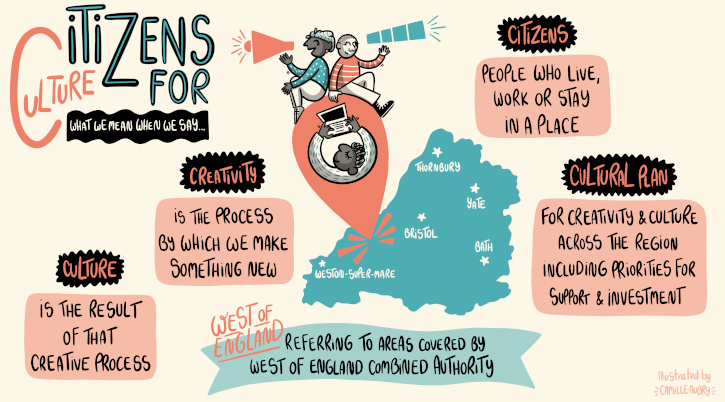
In partnership with St Paul’s Carnival/Trinity and Citizens In Power, we are exploring how to co-create a cultural strategy for the West of England region with citizens.
During this research phase, funded by Calouste Gulbenkian Foundation (UK Branch), we invited a range of collaborators from the sector who place participation at the heart of their practice to hear from some of the best speakers working in democratic decision making right now.
Part 5: Deliberative Workshops
In January and February 2023 we organised three deliberative workshops with the aim of devising a long-term, citizen-led process that will shape a cultural plan for the area.
In our first session, we heard from Sarah James, the Creative and Cultural Programme Lead at West of England Combined Authority. She spoke about the Combined Authority’s Cultural Compact – a group consisting of representatives from four Unitary Authorities (Bath and North-East Somerset, Bristol, North Somerset, South Gloucestershire) that aims to focus and amplify the role of culture in the region as a driver for economic success, placemaking, community cohesion and personal wellbeing. Sarah talked us through the evolving Cultural Plan for the region and how this connects with other active cultural conversations in the area.
The group then briefly discussed the application process for previous rounds of the government’s City Of Culture competition, from the initial expression of interest through to the judges’ panel visit and interviews. It was agreed that it would be up to the Citizens’ Assembly for Culture as to whether an application for future competitions would be relevant or not.
The group then moved on to discuss the idea of Deliberation – a key methodology used in Citizens’ Assemblies. We heard from Professor Alan Renwick (Deputy Director at UCL’s Constitution Unit) who described the key components which lead to deliberative and consensus decision-making and how this differs from a more conventional debating approach.
Following this first session, we felt that it would be good to bring some of the principles Alan Renwick discussed to life with a couple of stories from inside a Citizen’s Assembly. Therefore, to start our second deliberative workshop, Executive Director of St Pauls Carnival and regular Citizens’ Assembly facilitator LaToyah McAllister-Jones shared some stories that helped immerse us back into the world of assemblies, understand more about their conduct, and remind us that there is expertise around these kinds of participatory processes in our teams and region for us to draw on.
Following this, we spent some time delving more deeply into the way Citizens’ Assemblies are organised and delivered. Sarah Allan, one of the UK’s leading experts in Citizens’ Assemblies, who is Director of Capacity Building and Standards at Involve, joined us to explore the way assemlies are designed along with some of the perceived strengths and weaknesses of the assembly model. She delved into the governance of Citizens’ Assemblies, and how the different stages of assemblies work. After considering the core components of a Citizens’ Assembly, we deliberated together to create a list of other exercises or approaches that we thought could add value to the assembly model.
In the final session, we came together to explore our ideas for a citizen-led process for the west of England region. We set out to create a long-term and affordable and citizen-led process that could create a Cultural Plan for the region. Our main questions and themes were: How can the process itself be creative & cultural? How can the process be inclusive and diverse at every stage? Who are the stakeholders in the process and how can we bring them on the journey? Could the assembly have a federal structure with sub-groups to reflect the different areas across the region? Based on the experience and discussions from all three of the deliberative workshops, we outlined a process as a basic prototype, to be tested with citizens and the wider sector in autumn 2023.
Find out more about the project

Becoming A City Of Culture
Becoming A City Of Culture
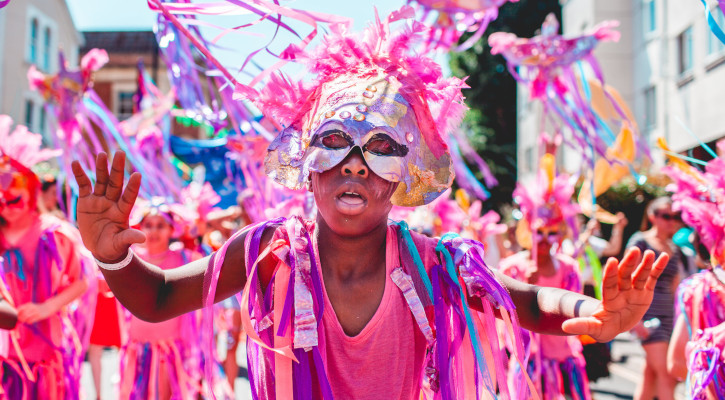
Image credit: St Paul's Carnival
In partnership with St Paul’s Carnival/Trinity and David Jubb of Citizens In Power, we are exploring how to co-create a cultural strategy for the city and surrounding region with citizens.
During this research phase, funded by Calouste Gulbenkian Foundation (UK Branch), we invited a range of collaborators from the sector who place participation at the heart of their practice to hear from some of the best speakers working in democratic decision making right now.
Part 3: Becoming A City Of Culture
In our third blog we reflect on the thoughts and experiences of Bradford 2025 team members, May McQuade and Jack Lynch who used the Citizens’ Assembly model as part of Bradford’s successful UK City of Culture 2025 bid.
May McQuade was the Programme and Community Coordinator for Bradford 2025. It was her role to explore what they would do if they were to win, and what programming could happen during the bidding period. This involved lots of consultation work, spreading the word around the bidding and getting people on board.
Jack Lynch worked on creating the campaign and brand for Bradford 2025. His role looked at how the City of Culture bid looked and felt, and the story they wanted it to tell. Jack spoke about being particularly keen to make something that felt truly original in Bradford, particularly with regards to how people normally spoke about the area.
The group were interested to explore what the catalyst was for this groundswell of positive engagement with the Bradford 2025 campaign. Jack shared that there was a focus on taking public opinion and universal truths about Bradford, and working them into the campaign. They found this was a way that everyone – from people in the arts sector to people in the street – could understand the aim of winning a City of Culture bid, and that this helped create a high level of engagement. The group discussed that ‘finding the city’s universal truths’ could be an important part of a City of Culture bid for Bristol.
Delving into the local authority’s involvement in Bradford 2025, May shared how the council had set up and invested in the trust then fully supported the bidding process. The decision for the bid to be separate from the council gave the team creative freedom.
There was a question posed from the group about the high number of people of Pakistani heritage living in Bradford, and how the bid was representative of this community. May spoke about several staff and steering group members being of South Asian heritage and the broad consultation events taking place in every ward of the district. May also shared that part of the bid’s focus was around improving representation in decision making roles within the arts, and supporting growth of the South Asian arts offer in Bradford. She went on to say that there are also many other Global Majority groups living in the area, and they wanted to make sure everyone was involved - which was admittedly difficult. The group spoke about Bristol’s arts sector not being fully representative of the diverse population of the city, and how there would need to be careful thought put into that during the bidding process.
When asked what the biggest takeaways were from the process, Jack spoke about understanding that from a marketing perspective this is essentially a political campaign. May shared that, on a personal level, she felt it was important to start with a pace that makes sense with the communities you’re working with and not push too hard from the beginning – it’s a fast paced process and can easily become overwhelming.
Interested in finding out more?
- Read the blogs so far: Part 1 What is a Citizen's Assembly? and Part 2 Art, for, with, by the people
- Keep up-to-date about the project by joining our mailing list
- Read Freddie Wulf's article: Identity Capital
- Watch Trinity's take over of the Radix Big Tent
- Join in the conversation using #67MillionVoices

What is a Citizens' Assembly?
What is a Citizens' Assembly?
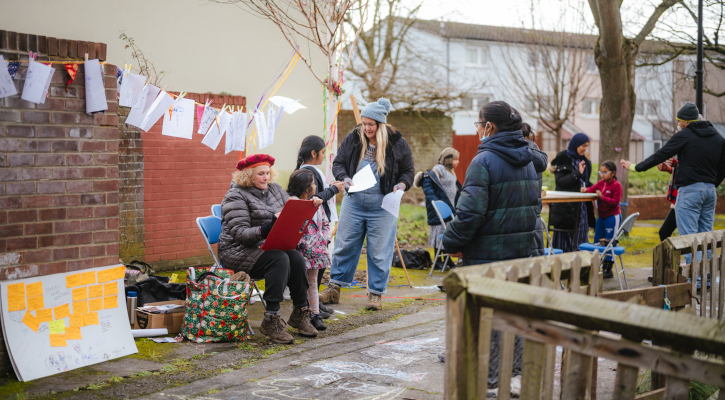
Community Painting Day. Photo credit: Khali Ackford
In partnership with St Paul’s Carnival and David Jubb of Citizens In Power, Trinity are exploring how we can co-create a cultural strategy for the city and surrounding region.
During this research phase funded by Calouste Gulbenkian Foundation (UK Branch), we invited a range of collaborators from the sector who place participation at the heart of their practice to hear from some of the best speakers working in democratic decision making right now.
These focus groups have been a chance to share ideas, experiences, knowledge and expertise on co-creation, participatory democracy and how we can do things differently in the culture sector.
In a series of blogs we are documenting and sharing what we are uncovering this journey.
Part 1: What is a Citizens' Assembly?
For the first focus group we welcomed Brett Hennig, co-founder of the Sortition Foundation. The Sortition Foundation is an organisation that believes in representative and participatory politics, with a particular focus on Citizens' Assemblies.
The purpose of these assemblies, Brett outlined, is that they bring people together from all walks of life and give the time and space for people to collectively tackle issues. It is a model, Brett shared, that Bristol itself has delivered as part of its plan for post-Covid recovery.
Citizens' Assemblies work by a three-part process of learning, discussion, and decision-making. In the learning stage, evidence is presented on the topic by ‘expert witnesses’, the group then discuss this evidence and work together to come to a consensus to create recommendations. These recommendations are then put to the vote. The recommendations that are most supported can become the official recommendations of the assembly.
Brett stressed the importance of having representation in a Citizens' Assembly, so the pool must be reflective of demographic data and, in the case of our project, cultural engagement. He shared that, unlike politics, Young People (30 and under) are represented in Citizens' Assemblies because of the nature of the selection process that reflects a city’s demographic data.
Participants of Citizens' Assemblies are selected via an independent third party - these organisations will initially contact citizens directly using a database, such as the Royal Mail’s database of every postal address in the UK. There is then a second selection of the people who respond to the invitation based on the demographic data they provide.
The group were interested in how the experts are selected - as this could be contentious. Using an example of congestion in a city, Brett explained that a Local Authority could commission an external third party to collect the evidence at hand, perhaps from an open call out. An Oversight Group for the assembly will be given the responsibility for ensuring the evidence that is presented to the assembly is balanced. Assembly members can also be part of the process of identifying contributors to the assembly. This would enable a wider pool of opinions, practically from those invested in the topic with expertise and/or lived experience.
The group wanted to understand how large a Citizens' Assembly should be. Brett shared that, in deliberative democracy, it is not a big numbers game. The key is representation. Brett shared that in Ireland, assemblies have seen numbers of up to 100 people, France had 150 in the Climate Assembly, but many local assemblies are around 40 people.
In summarising his talk, the discussion centred around how to ensure that voices are heard and amplified in Citizens' Assemblies, specifically those from Communities who may face barriers to participation. Brett shared that perhaps over-representation could be a consideration so that more communities are attending for specific areas whose voices are historically not amplified. Brett also explained that representation is not only about the citizens in the assembly but also about the voices of those who give evidence.
Interested in finding out more?
We will continue to share our findings from the research stage our project alongside programming further focus groups and action-learning sessions.
- Keep up-to-date about the project by joining our mailing list
- Read Freddie Wulf's article: Identity Capital
- Watch Trinity's take over of the Radix Big Tent
- Join in the conversation using #67MillionVoices

Culture for civic participation
Culture for civic participation
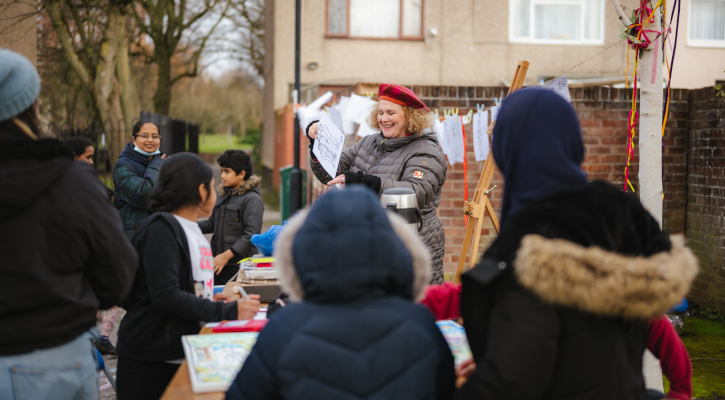
Community Paint Day, credit Khali Ackford
During the summer, Trinity and other members of Bristol's DIY Arts Network teamed up with Radix Big Tent Ideas Festival to shine a light on the city's cultural offer.
Cultural leaders from across the city came together to share their experiences of how culture can drive change in the city. Leaders such as Carolyn Hassan, Director of Knowle West Media Centre, who talked about the importance of investment in arts and culture (see above). Watch the full series of provocations about how culture can drive change here.
As a community arts organisation Trinity are committed to creating pathways for people to take part in civic life, to have the right for freedom of expression and to celebrate both the heritage we share and the differences we may have.
From our Art of Resistance project exploring the human stories behind activist movements in Bristol to supporting residents to programme activities in their neighbourhoods and celebrate local successes, Trinity supports access to culture to give people a voice and the freedom to make positives changes about the things that matter to them.
In partnership with Eastside Community trust and Somali Kitchen, we are collaborating with local residents to create opportunities to learn more about taking part in civic life. From Night Clubs for the over 55’s, to supporting local artists to develop their ideas, to celebrating the places people live.
Through funding from the Calouste Gulbenkian Foundation (UK Branch) we are collaborating with St Pauls Carnival and David Jubb of Citizens In Power to explore if a Citizens Assembly model could be used to co-create a cultural strategy for the city and surrounding area. This model of participatory democracy brings people together from all walks of life together to collectively tackle issues and has been used successfully during Coventry's City of Culture.
Over the next year we are going to be pulling all these strands of work together to further explore how co-creating with communities and creating the space for democratic decision-making can enable people to use culture and creativity as a vehicle to empower, amplify and respond to the issues they hold true.
Interested in finding out more?
- Follow #67MillionVoices on socials and join in the conversation about what culture means to you.
- Sign up to our mailing list to find out how you can take part and get up-to-date
- Read $ Identity Capital $



Can Bristol co-create for the future?
Can Bristol co-create for the future?
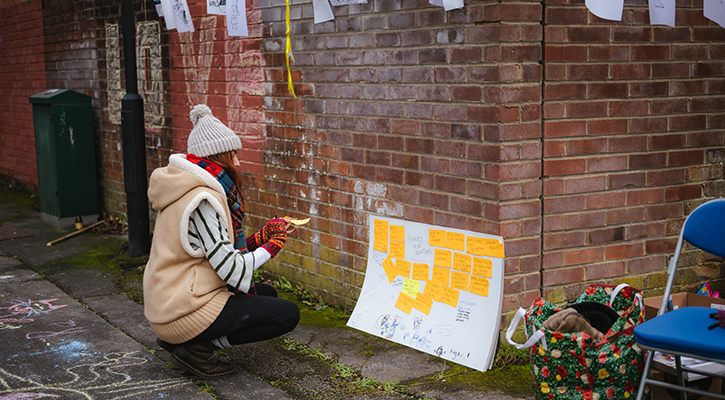
Community Painting Day part of the Wish List. Photo credit Khali Ackford
We have joined forces with St Paul’s Carnival to launch an ambitious project that aims to pilot a new people-led model for culture. Together, we want to support people to take decisions, make change and create culture that matters to them.
St Paul’s Carnival and Trinity are both grassroots, independent organisations based in East Bristol. Alongside delivering citywide events, we both work with local communities to design and deliver creative and cultural provision throughout the year.
The Calouste Gulbenkian Foundation (UK Branch) has committed funding for this research and development project, to test a process in which citizens could lead the creation and design of a cultural strategy for Bristol and the surrounding region.
Trinity and St Pauls Carnival will collaborate with the Gulbenkian Foundation, David Jubb of Citizens In Power and others to develop a bottom-up approach within the city that speaks of the collective experiences of diverse communities in order to better shape future decision making.
“We want to explore a different approach - one in which the very people who make and enjoy culture have a voice to express what this means for our city.” LaToyah McAllister-Jones Executive Director of St Pauls Carnival
Over the next year, the pilot will explore tested models such as Citizens’ Assemblies - used in Bristol in 2021 as part of the city’s post-COVID19 recovery planning - to input and shape democratic decision making in Bristol; a city known for its arts and culture.
This research phase will run until Summer 2023 and will involve a series of targeted workshops and open sessions, that will explore different ways of co-creating with communities.
If you would like to get involved, or for more information, please contact esther@trinitybristol.org.uk or sign up to Trinity’s Mailing list.




